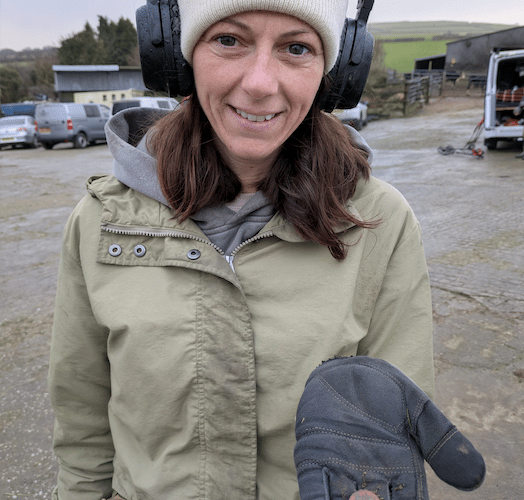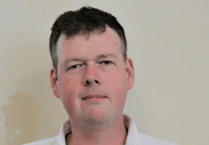I CAN’T imagine there are many better feelings than digging up some long-lost treasure.
Being the first to hold an artefact that hasn’t been touched for hundreds or even thousands of years would be an amazing experience.
Metal detecting machines make that dream become a reality and an increasing number of people are discovering what a pleasant pastime it is.
North Cornwall Metal Detecting Club set up by Adrian Farquharson helps people in their quest to find buried treasure.

The group has 1,500 members and attracts around 40 to 50 people on an organised dig.
Various treasures have been discovered including a late Bronze Age gold ring, Roman coins, axe heads and medieval hammered coins.
After recently reporting on the gold ring that was discovered on farmland I was invited to come along and have a go myself.
I thought what have I got to lose?
I joined around 40 people on a North Cornwall Metal Detecting Club dig on land near St Columb Major.
The first thing I discovered wasn’t buried treasure but how much more difficult metal detecting is than you might think.
The metal detector that I was given to use was making all sorts of noises, constantly.
Adrian explained it takes around 100 hours to learn your machine, so you know what sound and reading is worth putting your spade in the ground.
I certainly had my work cut out.
The sound on my headphones I was told to listen out for was a crisp signal rather than a grunt at the end, which would more likely to be iron.
I wandered up the field swooshing my metal detector from side to side in eager anticipation I would hit pay day.
The unmistakeable crisp signal I was listening out for soon started ringing in my ears.
Could this be the moment? Could it be a treasure trove of gold coins or a hoard of axe heads that I hear about to be unearthed.
I dug as carefully as I could as to not damage anything that was buried in the ground.
I saw a glint of something but my eager anticipation was soon replaced by disappointment as I realised...it was a piece of foil.
Other occasions I heard a crisp signal only to find there was nothing there.
There was certainly no beginner’s luck for me but others in the group, who were much more skilled at metal detecting, were soon finding all sorts of treasure.
A silver thimble was discovered, which Adrain believes could have been lost by a farm worker whilst they were mending sacks in the field.

Other finds included a sixpence that could have been lost in the 1940s by a farm worker as well as a medieval waterspout and a musket ball.

Metal detecting has seen a surge in popularity in recent years due to programmes such as Aussie Gold Hunters and the comedy series The Detectorists.

Adrian explained how he got into metal detecting.
“I got into metal detecting around 20 years ago when my partner asked me what I would like for my birthday.
“I said I would quite like to have a go at metal detecting.
“I received a metal detector, and I found a silver hammered coin and got the bug.
“The attraction of metal detecting is different for everyone but for me it’s having the opportunity to wander around a field and enjoy a bit of peace of mind rather than worrying about everyday life.
“The bonus is that you get to find that coin that’s been in the ground for more than 1,000 years and I’m the first person to hold it since it was lost or buried. That’s the amazing thing.
“I also find the friendships that develop through metal detecting through the years is a good thing.
“I always say I can guarantee people who come on a dig they will have a cup of tea and a laugh, but I can’t guarantee they will find treasure.
“Some people might get lucky and find a silver coin whilst all others might find are some buttons.”
Just finding a place to metal detect can be a challenge.
Adrian said: “Every bit of land is owned by someone, and you must get permission to metal detect on their land.
“You cannot just turn up though there are a few Cornwall Council beaches where you can metal detect without permission.
“I normally I have to knock on the door of 30 farms to get permission to metal detect on their land.
“The farmer will receive a fee for allowing the group on their fields for the day.
“Anything that is sold for over £1,000 the farmer and the person who found it receives a 50/50 share of the value of the item that is classed as treasure.”
Finding artefacts is not all luck though as a lot of digging goes into it.
Adrian said: “I do a lot of research on the place that we are metal detecting to find out what activity has taken place in the area in the past.
“Here for example, I discovered there was once a medieval tin streaming works and a medieval playing place, which was a medieval outdoor theatre.
“The more concentrated activity there has been in the past the more chance you have of finding something interesting.
“Saying that you can metal detect in a field where there has been no recorded history and find something.
“So, you can create your own history.”
Kirsty Dickens from Crantock who discovered the sixpence said: “I like to come out metal detecting with my dad. It is also great to meet new people.

“It is exciting because you do not know what you might find.
“You might find something that was lost many years ago and you are the first person to find it again.
“I’m also interested in the history. I like going home and cleaning what I’ve found and researching what it is.”
Anyone interested in having a go at metal detecting or are a landowner and are interested in having the group along to get in touch either via the website www.north-cornwall-metal-detecting.co.uk/ or the Facebook page.




